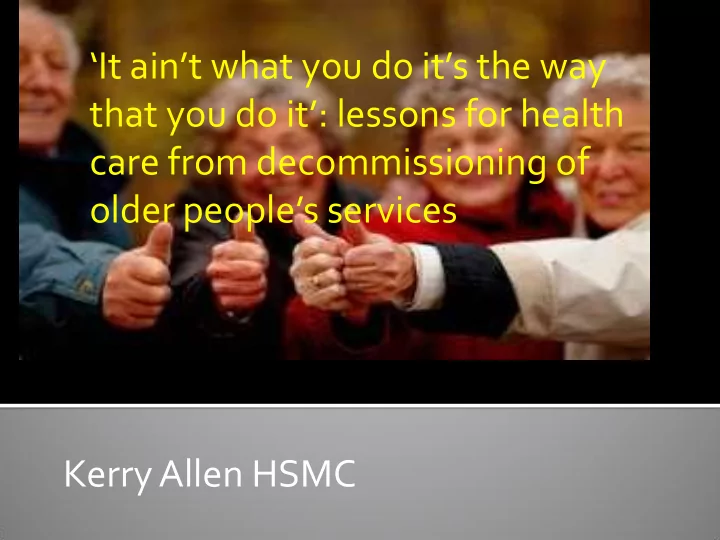

‘It ain’t what you do it’s the way that you do it’: lessons for health care from decommissioning of older people’s services Kerry Allen HSMC
Background to the study • Concerns raised over the failing Southern Cross care home company • A number of LA have significant experience of managing care home closures • Directors of Adult Social Services (ADASS) and government wanted to gain insight into such practice based knowledge • commissioned by ADASS and formed part of a wider project that was tasked with developing guidelines for those undertaking care home closures.
Interviews focused on the following: ADASS identified a Directors’ and LA experience of number of organisations managing care home closures. and directors who had Nature and scale of the closure programme extensive experience of Principles, processes and mechanisms home closures. used locally Whether or not they had local guidelines and how helpful/current The research team then these seemed. What impact the closures seemed to approached each have different groups director individually via Lessons they learned about what email to request constitutes good practice. permission to conduct Key barriers and success factors. an in-depth telephone What advice they would give to others facing a similar situations (including interview. their top three priorities for others). What would help in terms of future policy or resources.
Decision making policies and procedures Communication and information Stakeholder involvement and collation building Leadership
Decision making policies and procedures No disinvestment decision is clear transparent decision easy or popular, having local making processes - important policy guidance that is for the legitimisation and perceived as fair and defence against legal or other reasonable was advocated by challenge those involved in home closures authorities need to be clear Many local policies had on their policy and decision evolved over time -often making sure this message is been developed following correctly communicated to experiences of home closures the wider stakeholder groups, (both good and bad). Also important to have a media strategy.
Communication and information Need to have robust decisions to disinvest in evidence to support a service can have a decisions ‘knock - on’ effect on great emphasis was other services placed on being honest Thus, need to examine and open with how a home closure stakeholders about may impact on other why the decision to services across the decommission a region. service is taking place.
Stakeholder involvement and collation building Requirement of public Whilst involvement of sector agencies to stakeholders groups was manage their crucial it was also felt authorising that once the decision to environments- that is close a home had been the key stakeholder made and groups whose support is communicated to required if rationing and stakeholders, then it was disinvestment decisions important to implement are to be considered the decision within the legitimate. given timescales.
Leadership Process of leadership middle tier of managers (in needs to be led and owned this case assessors) play an by the senior management important role in team overseeing the leadership tasks pertain to implementation process more complex, relationship-based issues Thus lessons here are around the distinct roles of influencing others, engaging key stakeholders etc), leaders around policy this involves skills such as development. creating alignment between stakeholders, fostering vision and mobilising support for change.
Disinvestment is difficult and complex Sharing best practice guidance and policy around what works is important working with the authorising environment is key to helping to legitimise the decision and reduce the negative fallout following disinvestment decisions. some of the challenges facing decision makers include: the need to develop and adopt fair decision making processes; the creation of a coalition of support; the need to manage and negotiate the political hazards and fallout associated with the withdrawal of services.
Given the financial challenge learning from each other about what works when decommissioning services seems crucial decommissioning decisions should be influenced by what we know about what constitutes best practice Where we lack detailed knowledge about what works within our own service or sector, there may often be similar examples and significant expertise in other areas/sectors – and we neglect this at our peril.
Recommend
More recommend